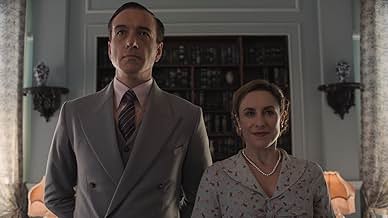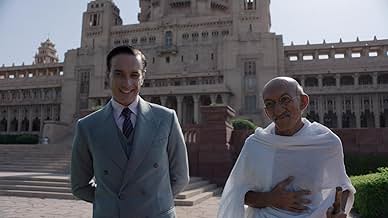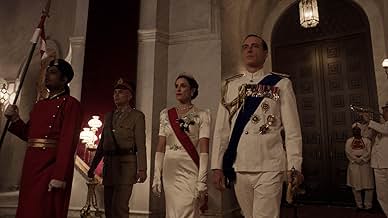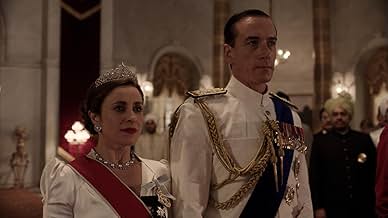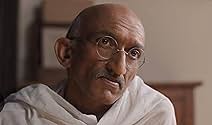Freedom at Midnight
- Série de TV
- 2024–
AVALIAÇÃO DA IMDb
8,3/10
2,2 mil
SUA AVALIAÇÃO
Adicionar um enredo no seu idiomaIs the electrifying story of India's struggle for independence. Based on the bestselling book of the same name, it recounts the partition of India and Pakistan, and the religious and socio-p... Ler tudoIs the electrifying story of India's struggle for independence. Based on the bestselling book of the same name, it recounts the partition of India and Pakistan, and the religious and socio-political dynamics of the era.Is the electrifying story of India's struggle for independence. Based on the bestselling book of the same name, it recounts the partition of India and Pakistan, and the religious and socio-political dynamics of the era.
- Prêmios
- 10 indicações no total
Explorar episódios
Avaliações em destaque
Freedom at Midnight on Sony Liv reinvigorates the story of India's Independence and partition with fresh energy. Anchored by stellar performances-Mountbatten, Edwina, Attlee, and Jinnah-it balances historical depth with sharp, modern storytelling. Gandhi and Nehru may seem miscast initially but evolve into compelling portrayals.
Focusing on key events like the Muslim League's Direct Action Plan, Congress-Muslim League tussles, 1937 provincial elections, the series skips exhaustive timelines in favor of precision. Highlights include Gandhi's Indigo Satyagraha, where his quiet resolve awes a young Nehru, the layered tension between Jinnah and Nehru, the contrasts between Nehru and Vallabhbhai among others.
With top-tier production-authentic sets, flawless costumes, and pitch-perfect casting-the series sets a new standard for period dramas. Understated performances by Edwina Mountbatten and VP Menon leave a mark, while Louis Mountbatten brings charisma and sophistication. Tight screenplay and sharp dialogues create a thriller-like momentum moving towards partition.
Director Nikhil Advani expertly handles sensitive themes with nuance and objectivity, avoiding glorification or clichés. Freedom at Midnight is a must-watch for its balanced narrative, stunning execution, and fresh take on history.
Focusing on key events like the Muslim League's Direct Action Plan, Congress-Muslim League tussles, 1937 provincial elections, the series skips exhaustive timelines in favor of precision. Highlights include Gandhi's Indigo Satyagraha, where his quiet resolve awes a young Nehru, the layered tension between Jinnah and Nehru, the contrasts between Nehru and Vallabhbhai among others.
With top-tier production-authentic sets, flawless costumes, and pitch-perfect casting-the series sets a new standard for period dramas. Understated performances by Edwina Mountbatten and VP Menon leave a mark, while Louis Mountbatten brings charisma and sophistication. Tight screenplay and sharp dialogues create a thriller-like momentum moving towards partition.
Director Nikhil Advani expertly handles sensitive themes with nuance and objectivity, avoiding glorification or clichés. Freedom at Midnight is a must-watch for its balanced narrative, stunning execution, and fresh take on history.
"Heat not a furnace for your foe so hot that it do singe yourself."
Freedom at Midnight is a series based on Larry Collins and Dominique Lapierre's gigantic bestseller of the same name. Given the piercingly researched, strikingly visual source-material, it was always meant to be. Collins and Lapierre finished the book in 1975, just 25 years after India gained independence.
Starting in the early 1970s, the authors had unprecedented personal access to Lord Mountbatten, who was a fan of their book "Is Paris Burning?". They also accessed Jinnah's X-ray, which proved that so-called Quaid-e-Azam knew he suffered from advanced stage tuberculosis and that he wouldn't survive long - maximum a year or so!! Mountbatten told Lapierre-Collins that if he knew this, he would have delayed the decision on partition, which would have then changed the course of sub-continent's history.
Nikhil Advani, the creator of the series, says he chose to focus on events leading up to India's independence. However, Freedom at Midnight is a difficult show to make, as it is about history and politics and relies heavily on verbose conversations, meetings, debates, speeches, decisions, exposition, heavy dialogues and individual's perception.
The series features impressive performances, particularly from Chirag Vohra as Gandhi and Rajendra Chawla as Sardar Vallabhbhai Patel. Vohra delivers a physically canny rendition of Gandhi, while Chawla nails the Gujarati twang and injects Patel's shrewdness with pangs of paternal sincerity.
It's worth noting that the book "Freedom at Midnight" has been adapted into various forms, including a TV series in 1988 and a movie Gandhi with Ben Kingsley directed by Richard Attenborough. While the movie focuses primarily on Gandhi's life and role in India's struggle for independence, this TV series takes a broader approach, covering the final years of British rule in India and the events leading up to independence. This series is more of a historic epic with more emphasis on political and social upheavals of the time. It manages to capture the essence of the time period.
I have a personal connection with this book having read it during my college days. It was one of the first books (first book being The Good Earth) in English literature that I read and it left an everlasting impression on me. Even today, it gives me goosebumps to think about the horrifying incidents written by the authors, particularly the riots that started in Punjab.
After reading "Freedom at Midnight", I became a huge fan of the author duo and went on to read their other books in a marathon session. I devoured "Is Paris Burning?", "O Jerusalem", "City of Joy" and "Fall from Grace", among others. I owe a debt of gratitude to my dear friend Chetan Desai who introduced me not only to Collins and Lapierre but also to other renowned authors like Leon Uris, Somerset Maugham, Ayn Rand, Hermann Hesse and more. He also sparked my interest in English literature that has been a lifelong passion since then.
While the series may be challenging to follow at times due to its focus on politics and history, it is undoubtedly a must-watch for anyone interested in last days of British Raj and dawn of India's freedom. The ability of this series to balance individual perspectives with historical events makes it a unique and engaging viewing experience.
Overall, Freedom at Midnight is a gripping and informative series that sheds light on a pivotal moment in Indian history. I do however recommend reading the book.
Freedom at Midnight is a series based on Larry Collins and Dominique Lapierre's gigantic bestseller of the same name. Given the piercingly researched, strikingly visual source-material, it was always meant to be. Collins and Lapierre finished the book in 1975, just 25 years after India gained independence.
Starting in the early 1970s, the authors had unprecedented personal access to Lord Mountbatten, who was a fan of their book "Is Paris Burning?". They also accessed Jinnah's X-ray, which proved that so-called Quaid-e-Azam knew he suffered from advanced stage tuberculosis and that he wouldn't survive long - maximum a year or so!! Mountbatten told Lapierre-Collins that if he knew this, he would have delayed the decision on partition, which would have then changed the course of sub-continent's history.
Nikhil Advani, the creator of the series, says he chose to focus on events leading up to India's independence. However, Freedom at Midnight is a difficult show to make, as it is about history and politics and relies heavily on verbose conversations, meetings, debates, speeches, decisions, exposition, heavy dialogues and individual's perception.
The series features impressive performances, particularly from Chirag Vohra as Gandhi and Rajendra Chawla as Sardar Vallabhbhai Patel. Vohra delivers a physically canny rendition of Gandhi, while Chawla nails the Gujarati twang and injects Patel's shrewdness with pangs of paternal sincerity.
It's worth noting that the book "Freedom at Midnight" has been adapted into various forms, including a TV series in 1988 and a movie Gandhi with Ben Kingsley directed by Richard Attenborough. While the movie focuses primarily on Gandhi's life and role in India's struggle for independence, this TV series takes a broader approach, covering the final years of British rule in India and the events leading up to independence. This series is more of a historic epic with more emphasis on political and social upheavals of the time. It manages to capture the essence of the time period.
I have a personal connection with this book having read it during my college days. It was one of the first books (first book being The Good Earth) in English literature that I read and it left an everlasting impression on me. Even today, it gives me goosebumps to think about the horrifying incidents written by the authors, particularly the riots that started in Punjab.
After reading "Freedom at Midnight", I became a huge fan of the author duo and went on to read their other books in a marathon session. I devoured "Is Paris Burning?", "O Jerusalem", "City of Joy" and "Fall from Grace", among others. I owe a debt of gratitude to my dear friend Chetan Desai who introduced me not only to Collins and Lapierre but also to other renowned authors like Leon Uris, Somerset Maugham, Ayn Rand, Hermann Hesse and more. He also sparked my interest in English literature that has been a lifelong passion since then.
While the series may be challenging to follow at times due to its focus on politics and history, it is undoubtedly a must-watch for anyone interested in last days of British Raj and dawn of India's freedom. The ability of this series to balance individual perspectives with historical events makes it a unique and engaging viewing experience.
Overall, Freedom at Midnight is a gripping and informative series that sheds light on a pivotal moment in Indian history. I do however recommend reading the book.
10wtxsxvz
I had read this book almost 45 years ago when I was in my twenties. So I was not sure whether the makers of the web series would be truthful to the book or would put their bias in. I was delighted to see that they were truthful to the book. For those who criticize the decisions made in 1946-1947, should realize that their arguments are based on the luxury of their knowledge of what happened between 1946 and 2024. The series shows the struggles all the leaders were having in deciding about partition. Everyone should watch this series with an open mind. Even Jinnah saw an opportunity to be the leader of a brand new country and took it. After all, he was a politician. Great series, production design, background score.
"Freedom at Midnight" deserves a solid 10/10 for its compelling portrayal of the events surrounding India's independence and partition. The documentary takes an unflinchingly honest approach, covering sensitive topics like the Bengal massacres, showing the horrors faced by hindus by communal violence. It manages to present these events without leaning into any biased narrative, allowing the raw reality of the partition's aftermath to speak for itself.
The creators have done exceptional work in balancing perspectives from all sides, bringing a level of depth and integrity to the narrative. The archival footage, firsthand accounts, and detailed explorations of the political tensions between the British, Hindus, and Muslims make the film not only historically accurate but deeply engaging. It brings to light the complexities of freedom and the tragic consequences of division, leaving viewers with a better understanding of a crucial period in history.
This documentary is a must-watch for anyone interested in unbiased historical documentaries. It goes beyond just recounting facts; it brings history to life, allowing us to reflect on the price of freedom.
The creators have done exceptional work in balancing perspectives from all sides, bringing a level of depth and integrity to the narrative. The archival footage, firsthand accounts, and detailed explorations of the political tensions between the British, Hindus, and Muslims make the film not only historically accurate but deeply engaging. It brings to light the complexities of freedom and the tragic consequences of division, leaving viewers with a better understanding of a crucial period in history.
This documentary is a must-watch for anyone interested in unbiased historical documentaries. It goes beyond just recounting facts; it brings history to life, allowing us to reflect on the price of freedom.
At the stroke of midnight on August 14, 1947, India gained freedom from over 200 years of British colonial rule. While the birth of a free India should have been a moment of celebration, it was overshadowed by the darkness of Partition. Nikkhil Advani's Freedom At Midnight, a latest web series on SonyLIV, which takes its title and story from Larry Collins and Dominique Lapierre's seminal book, offers a powerful glimpse into the trials, tragedies, and turmoil of that fateful period.
The series begins in 1946 with a persistent Mahatma Gandhi declaring, "Hindustan ka batwara hone se pehle, mere shareer ka batwara hoga (Before the Partition of India, my body will be divided)." It soon moves over to offer a painful account of India's Partition and the violent birth of Independent India. Religious conflicts, border wars, and political sacrifices unfold with each episode, like dramatic scenes in a grand pageant.
The dialogues and performances strike emotional chords quite effectively. Take, for example, lines like "Aam aadmi vo badlaav laa sakta hai jo sarkaar saalon mein nahi laa sakti" (The common man can bring about change that the government couldn't in years) or "Ye log Hindu hone se pehle bhi Punjabi ya Bengali hain" (These people are Punjabi or Bengali before they are Hindu).
The central characters in the show include Lord Mountbatten, the great-grandson of Queen Victoria, who constantly haggles with Jawaharlal Nehru, the leader of the Congress party, torn between his principles and his party's ideals; Mohammed Ali Jinnah, the fanatical leader of the Muslim League, who sees only two options: "Ya toh Hindustan batega ya barbaad hoga" (Either Hindustan will be divided, or it will be destroyed); and MK Gandhi, who ultimately gives up his dream of a united India, over the terms of how an independent India will move forward.
Siddhant Gupta, who was well admired in Prime Video's Jubilee, once again proves his acting prowess as he steps into the role of India's first Prime Minister, Jawaharlal Nehru. But the standout performance comes from Arif Zakaria as Mohammed Ali Jinnah. He is utterly convincing as the resolute leader of the Muslim League, whose singular vision was the creation of Pakistan. Chirag Vohra as Gandhi and Rajendra Chawla as Sardar Vallabhbhai Patel also deliver strong performances. The supporting cast further elevates the series, adding an extra layer of depth to the story.
Nikkhil Advani closes the show just before the horrors of the Partition unfold on India's land, accompanied by the song "Vaishnav jan to tene kahiye je, peer paraayi jaani re" (A good human being is the one who knows the pain of others). It's a haunting note that leaves you wishing political leaders, from any period - past or present - could truly feel the pain of the people they serve.
Not only is it competently crafted and acted, it also tells a story replete with known and unknown nuggets of information that are processed with skill and sensitivity. It has no grandstanding, and no hectoring and hollering of the sort that mainstream Bollywood is prone to.
The show gives history its due, meticulously piecing together the fragments that went into the making of an essential and wondrous, if inevitably imperfect, whole.
The series begins in 1946 with a persistent Mahatma Gandhi declaring, "Hindustan ka batwara hone se pehle, mere shareer ka batwara hoga (Before the Partition of India, my body will be divided)." It soon moves over to offer a painful account of India's Partition and the violent birth of Independent India. Religious conflicts, border wars, and political sacrifices unfold with each episode, like dramatic scenes in a grand pageant.
The dialogues and performances strike emotional chords quite effectively. Take, for example, lines like "Aam aadmi vo badlaav laa sakta hai jo sarkaar saalon mein nahi laa sakti" (The common man can bring about change that the government couldn't in years) or "Ye log Hindu hone se pehle bhi Punjabi ya Bengali hain" (These people are Punjabi or Bengali before they are Hindu).
The central characters in the show include Lord Mountbatten, the great-grandson of Queen Victoria, who constantly haggles with Jawaharlal Nehru, the leader of the Congress party, torn between his principles and his party's ideals; Mohammed Ali Jinnah, the fanatical leader of the Muslim League, who sees only two options: "Ya toh Hindustan batega ya barbaad hoga" (Either Hindustan will be divided, or it will be destroyed); and MK Gandhi, who ultimately gives up his dream of a united India, over the terms of how an independent India will move forward.
Siddhant Gupta, who was well admired in Prime Video's Jubilee, once again proves his acting prowess as he steps into the role of India's first Prime Minister, Jawaharlal Nehru. But the standout performance comes from Arif Zakaria as Mohammed Ali Jinnah. He is utterly convincing as the resolute leader of the Muslim League, whose singular vision was the creation of Pakistan. Chirag Vohra as Gandhi and Rajendra Chawla as Sardar Vallabhbhai Patel also deliver strong performances. The supporting cast further elevates the series, adding an extra layer of depth to the story.
Nikkhil Advani closes the show just before the horrors of the Partition unfold on India's land, accompanied by the song "Vaishnav jan to tene kahiye je, peer paraayi jaani re" (A good human being is the one who knows the pain of others). It's a haunting note that leaves you wishing political leaders, from any period - past or present - could truly feel the pain of the people they serve.
Not only is it competently crafted and acted, it also tells a story replete with known and unknown nuggets of information that are processed with skill and sensitivity. It has no grandstanding, and no hectoring and hollering of the sort that mainstream Bollywood is prone to.
The show gives history its due, meticulously piecing together the fragments that went into the making of an essential and wondrous, if inevitably imperfect, whole.
Você sabia?
- CuriosidadesAdapted from the book of the same name, authored by Dominique Lapierre and Larry Collins.
Principais escolhas
Faça login para avaliar e ver a lista de recomendações personalizadas
Detalhes
- Data de lançamento
- País de origem
- Central de atendimento oficial
- Idioma
- Empresas de produção
- Consulte mais créditos da empresa na IMDbPro
- Cor
Contribua para esta página
Sugerir uma alteração ou adicionar conteúdo ausente

Principal brecha
What is the Brazilian Portuguese language plot outline for Freedom at Midnight (2024)?
Responda
![Assistir a Trailer [OV]](https://m.media-amazon.com/images/M/MV5BOWRlODBkMWItNzdlMC00MDhjLThmNjAtNGYyMzg0NDNlZmI3XkEyXkFqcGdeQXRyYW5zY29kZS13b3JrZmxvdw@@._V1_QL75_UX500_CR0)
